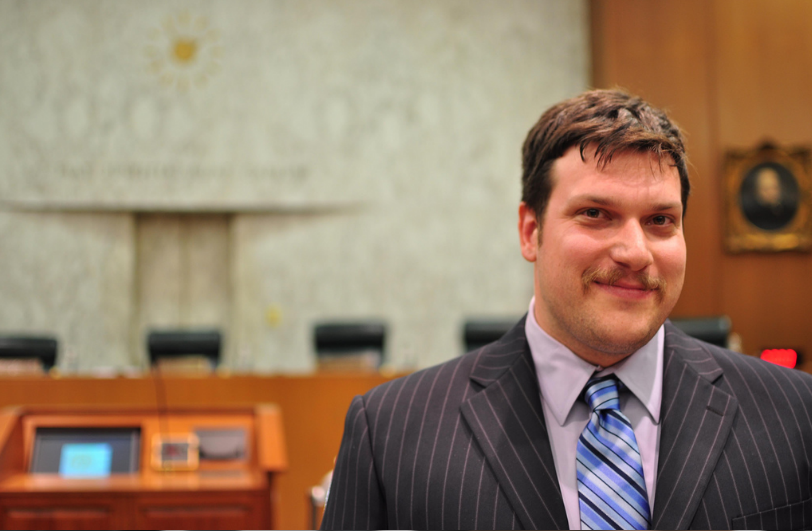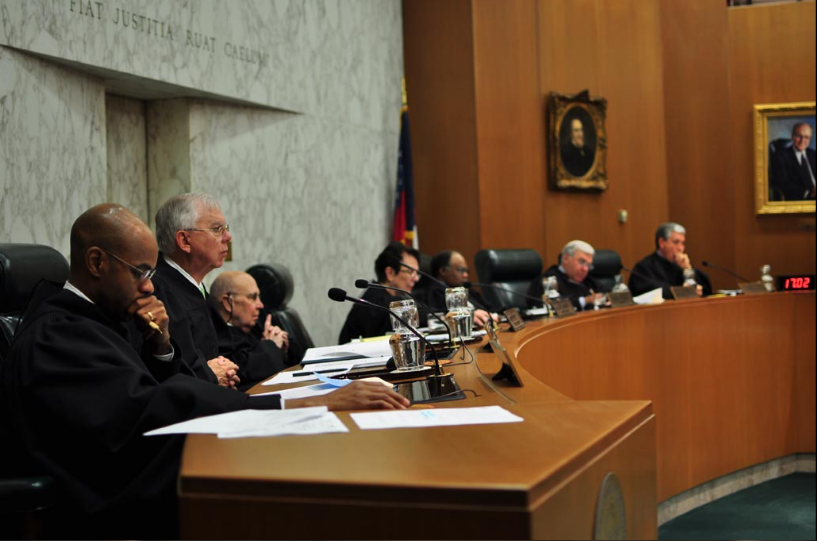Georgia Supreme Court Hears Arguments in Secret Vote Case
(APN) ATLANTA — The Supreme Court of Georgia heard oral arguments in Cardinale v. City of Atlanta, S11G1047, on Tuesday, October 04, 2011, at 240pm.
Atlanta Progressive News’s Editor–the present writer–appeared to argue that the City of Atlanta, and agencies across the State of Georgia, are not permitted to take secret votes.
Amber Robinson, a City Attorney, appeared on behalf of the City, to argue that the names of the Council Members voting nay in a February 2010 vote on limiting public comment, did not have to be listed in the minutes.
The Fulton County Daily Report has posted their original videos of the proceeding on their website, and has made the videos available to the general public, in addition to Daily Report subscribers, HERE.
Generally, the Justices asked more questions of the City of Atlanta to explain and defend their position, than they did of APN’s Editor, although some questions asked of APN’s Editor are noted below.
“I’m a pro se litigant here today fighting for the rights of citizens across the State of Georgia to have transparent, representative government. I’m fighting for something very simple, yet fundamental to the integrity of our democracy: the ability of citizens to know how their council members or county commissioners, who are supposed to represent them, voted,” APN’s Editor said during oral arguments.
“Let me say thank you to this Court for granting my petition for certiorari. This Act is actually about the rights of ordinary citizens, so I feel honored to be here today as an ordinary citizen to talk about this issue,” APN’s Editor noted.
“I want to start with the Georgia Constitution, Article 1, Section 2, paragraph 1, ‘Public officers are the trustees and servants of the people and are at all times amendable to them.’ At all times – not just sometimes,” APN’s Editor noted.
The main argument by APN’s Editor was that the vote recording requirements under OCGA 50-14-1(e)(2) should to be interpreted broadly, and in conjunction with the intention of the Legislature, as to require that agencies list those voting against any proposal or abstaining in the minutes in the case of non-roll call votes.
The City of Atlanta, for its part, argues that the law only requires the vote to be assumed unanimous if no names are listed, even when the vote is not unanimous.
“It’s an open meeting, wasn’t it? Complying with the intent of the statute?” Chief Justice Carol Hunstein asked APN’s Editor.
“If we don’t know how they voted, then I would say that it doesn’t comply with the section of the statute talking about the recording of votes in the minutes. The statute has, the meeting has to open, there has to be an agenda, there has to be advertising, and there has to be minutes, and all of those come together,” APN’s Editor replied.
“Well couldn’t the newspapers there have reported what the vote was?” Justice Robert Benham asked.
“That’s actually something that I tried to do with my publication, I actually asked for the vote, they refused to give it to me. I asked the individual Council Members for their vote. Nine of them would give it to me, six refused,” APN’s Editor noted.
Later, Chief Hunstein asked Robinson, “Why wouldn’t the Members of the Atlanta City Council just say how they voted? When he called, when Mr. Cardinale called, why wouldn’t they say, well, I voted for or I voted against, even though it wasn’t a roll call? It was a public meeting. There are people who know how they voted. Why wouldn’t they just simply give him the information?”
Robinson said she did not know why Council Members would not reveal how they voted because the information was not in the lower court record. In other words, the City Attorneys do not know the motivations of their own clients, nor the reason for expenditure of thousands of dollars in taxpayer resources in defending the secret vote.
Incidentally, the trial court record actually includes an email from Councilman Alex Wan (District 6), who wrote to City Attorneys in the weeks following the secret vote, “I have no intentions of answering his question. I don’t appreciate this manner of bullying over a matter I believe he will have little or no grounds for any lawsuit.”
“That said, I wanted to make sure that as our counsel, you’re comfortable with my position and that if he does end up filing the lawsuit as threatened that the City is prepared to defend me and any other Councilmembers that choose not to submit to his tactics,” Wan wrote.
Justice Nahmias appeared quite critical of the City of Atlanta’s position.
Initially, Nahmias’s reading of the law appeared to be similar to what APN’s Editor and numerous community members understood when first reading the Act in 2010, and with what APN’s Editor is calling a common sense, reasonable interpretation of the Act.
When APN’s Editor was first making oral arguments, Nahmias asked, “Can I ask you just to be clear on how you say the statute would work, if there’s a roll call vote then all the yeays and nays and abstentions get listed. If it’s not a roll call vote, and it is in fact unanimous, you just have to say there was a vote and it’s assumed to be unanimous. But if it’s not a roll call vote and it’s not unanimous, then you don’t have to list the ayes, you just have to list the nays.”
“Right. And the abstainers, and then we can assume that everyone else voted for in favor,” APN’s Editor said.
“So it would look a lot like our opinions, where we say all the Justices concur except, and we list the dissenters,” Nahmias said.
Later, when Robinson was making oral arguments, Nahmias asked, “The records, the official records of a government meeting in Georgia, that was hotly debated and split 8-7, the official records can say presume this was unanimous, when in reality it was split. You think that’s what the Legislature intended and that’s how this statute works? And you think that’s the right result on behalf of the City of Atlanta?”
“I think that’s exactly what the Legislature intended,” Robinson replied. “The Legislature, I believe, was quite plain.”
Later Justice Benham raised concerns about whether the position of APN’s Editor would require votes to be taken on trivial matters such as whether to bring in lunch.
“If at the Retreat, as they were getting ready to leave, one of the issues raised was, I’d like to see those people who need rides home, and some raise up their hands and say they need rides back home and others don’t, are you saying that needs to be recorded too?” Benham asked.
APN’s Editor replied, “I don’t believe so.”
“What’s the distinction?” Behnam asked.
“It’s not any kind of official City business, in my opinion,” APN’s Editor replied.
According to Jane Hansen, Public Information Officer for the Supreme Court, the case is scheduled to be decided by April of 2012, although it could be decided earlier.
Prior to oral arguments, Amicus Briefs were filed by the Attorney General Sam Olens and the Georgia First Amendment Foundation; both were favorable to the position of APN’s Editor.
Another prominent Georgia organization is currently working on an additional Amicus Brief.
(END/2011)

